Article
Empowering girls and communities through quality education

Meet these adolescent girls and young women achieving their dreams through education, and the parents and community members supporting their education and empowerment in Mali, Nepal, and the United Republic of Tanzania.
These individuals have been part of the Joint Programme on Empowering Adolescent Girls and Young Women through Education. Grounded in the collective commitment of UNESCO, UN Women and UNFPA, the Joint Programme applies a coordinated and multi-sectoral approach to empower girls and young women through quality education.
First stop, Mali
In Mali, over 5,600 out-of-school girls and young women were empowered through literacy and vocational training, and learned about sexual and reproductive health. Some 200,000 community members were also sensitised on girls’ retention, re-entry and access to education and 3,560 teachers, school administrators, parents and community leaders benefitted from trainings to foster inclusive and safe learning environments for girls in schools. School-age girls and boys who were displaced due to inter-communal conflict have also been re-integrated into the formal school system.
Adama, a bright learner from Mopti
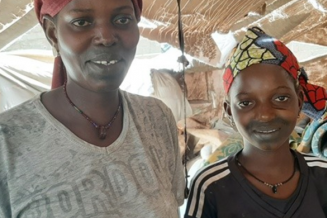
“I like learning”, says Adama. “My first language is Fulfulde but I also can speak Bambara. I learned this language with my classmates at school.”
Adama, aged 11, was forced to leave her hometown with her family to flee from inter-communal conflict between the Peul and Dogon ethnic groups in Mopti, central region of Mali. She and her family are living in a refugee camp on the outskirts of Bamako.
“An educated person is more important than an illiterate one”, says Aminata, Adama’s mother. “I want her to study and get a good job after she finishes school.”
Adama had the chance to return to school through the joint efforts of UNESCO, UNFPA and UN Women to re-integrate internally displaced children into the formal school system in Bamako. At school, Adama learned to read and write in French, speak Bambara, the local language used in Bamako, and even made new friends.
When schools closed to contain the spread of COVID-19, Adama could not continue learning because she didn’t have access to the internet and had to focus on household chores. The Joint Programme enabled students like Adama to continue learning with refresher courses that were disseminated on the national television channel.
Adama has since returned to school. However, schools and access to education remain threatened by the ongoing conflict. Adama urges political leaders to do all they can to end the civil war so that she and her family can return to their hometown, and to ensure that girls like herself are able to continue their education.
Next stop, Nepal
In Nepal, the Joint Programme worked across 5 districts and with 14 municipalities. Over 6,300 girls and young women came together in community learning centres or local resource hubs that foster education and livelihood for marginalised groups. Out of these girls, 1,874 participated in functional literacy classes integrating comprehensive sexuality education and mother tongue-based multilingual education to ensure an inclusive and equitable education. Nearly 4,470 girls and young women also participated in vocational skills courses, out of which 1,458 started generating an income.
Chanda, a champion for girls from Rautahat
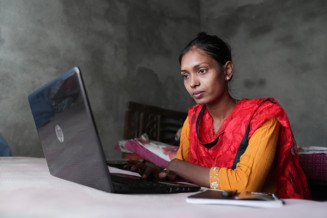
“Pregnancy at a young age has huge costs on girls’ reproductive and psychological health. And they are subjected to gender-based violence”, says Chanda. “We must empower girls to speak out for their own rights and well-being. That’s why I will continue to work in education.”
Chanda, aged 23, had dropped out of school when she engaged with the Joint Programme and received vocational training. She was inspired to pursue a career in education while working as a facilitator for the UNESCO-led functional literacy classes.
Chanda works with girls who dropped out of school, girls who have never been to school, and girls who married young. “Child brides are denied further education, lack literacy, and are unable to manage their finances, making them completely dependent on others”, says Chanda. She believes that efforts to uplift girls and women must complement efforts to reduce early marriage.
Chanda has been able to follow girls’ progress after their participation in the classes. She noticed incredible improvement in their confidence stemming from their participation and learning. However, the lockdowns throughout the pandemic resulted in many girls returning to farm work and parents taking advantage of lower dowries to marry their daughters. There is still much progress to be made to change the attitudes of parents and guardians towards their daughters.
Despite these challenges, Chanda is committed to working with adolescent girls to inspire them and change social attitudes towards girls’ education.
Dhauli, an entrepreneur and role-model from Bajura

“I couldn’t even recite the alphabet before I took the classes. Now I have the confidence to speak at workshops”, says Dhauli. “Education is important – without the trainings I received, I couldn’t have started my own enterprises.”
Dhauli was married at age 12 when her mother died, so she never had the opportunity to go to school. She attended the Joint Programme’s functional literacy classes, through which she developed entrepreneurship skills.
Since joining the classes, Dhauli started a grocery shop and runs a farm. She has already taken out NPR 400,000 (US$ 3,300) in bank loans to invest in her shop and the investment has paid off. She currently earns up to 4,500 NPR (US$ 37) each day. She has also been able to expand her family farm by purchasing buffalos and pigs.
Dhauli is the first person in her family to be financially literate. She is inspiring her peers through entrepreneurship skills and extending her knowledge to her husband and children. For Dhauli, the freedom of running her own business is also tied to securing a future for her daughters.
“I didn’t get to study but with my earnings, I can make sure that my daughters will get an education”, she says. “This must improve our future. I may have been an illiterate woman, but my daughters will not be.”
Komal, an advocate for girls’ education from Rajpur Farhadawa

“I used to think that I was a poor student, but now I know that I am a good student and can do well”, says Komal. The functional literacy classes have improved my life. I am confident that I will do well in the future.”
Komal, aged 15, dropped out of school by the time she was in grade 6 because of frequent teacher absences and low engagement. However, two years later, she took part in the classes and was inspired to go back to school as she discovered the value of her education.
Komal learned how to advocate for her own education, how to recognize and report gender-based violence, and how to pay attention to her own reproductive health and address health concerns. She even learned about sexual exploitation and human trafficking, and how to protect herself.
Komal also participated in a radio programme organized by UNESCO where she interacted with local leaders and stakeholders from her district. She discussed health, education and issues affecting youth with them. The experience boosted her confidence and helped her overcome her fear of public speaking.
Komal was empowered through the Joint Programme and inspired to pursue a future advocating for girls’ education. “I believe that all girls should have an education”, she says. “I want to be involved in similar programmes in the future so that I can motivate other girls to study.”
Parbati, an FLC facilitator from Simalkot
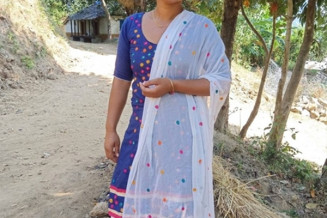
“To watch them learn to read and write before my own eyes – that filled me with pride and satisfaction”, says Parbati, a facilitator for the Joint Programme’s functional literacy classes and youth advocacy coordinator from Simalkot. “I realized how important education is in showing people their potential.”
When Parbati began teaching the classes, she noticed that the women who attended the trainings lacked the literacy skills needed to sign their own names. As she taught them the Nepali alphabet and numeracy skills, she noticed they gained interest in learning even more. Parbati helped the women gain a sense of pride as they no longer had to sign official documents with a thumbprint.
Parbati also organized interactive sessions with learners in Achham, where she discussed pregnancy, family planning and menstrual hygiene. She advocates for ending harmful practices, including sexual harassment, violence against women and girls and early marriage.
Teaching literacy to women has been especially rewarding for her as a facilitator as she has witnessed the transformation of women from learners to entrepreneurs. Beyond literacy, the functional literacy classes teach women about organizing savings and investment groups. Many of the women started their own businesses.
Parbati noticed that the women of Simalkot are excelling in the classes and asking for more educational opportunities. “If they have come this far after one round of training, imagine what they can achieve with more.”
Ratan, a transformed mother from Duni
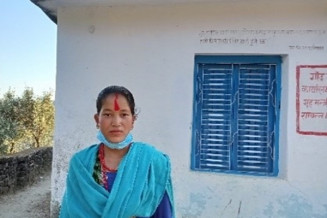
“The first day attending the class was one of the happiest days of my life”, says Ratan. “I wanted to continue my education to secure a good future for my child. I have to be a good example for my daughter.”
Ratan, then in grade 6, was forced to drop out of school because she was arranged to be married. She became a mother at age 21 and cared for her family. Ratan’s options were limited, as engaging in public activities outside of the home is often stigmatised according to social customs in the Sudurpashchim Province of Nepal.
After convincing her family, Ratan attended the functional literacy classes held under the Joint Programme. “At first, she was too shy and nervous to introduce herself in the class, but now, she can speak her mind in front of a crowd”, says Saraswoti, Ratan’s facilitator.
Ratan gained confidence as her literacy skills improved and she learned about family planning, reproductive health and hygiene, and harmful cultural practices. Ratan often shares her new knowledge, especially about reproductive health and hygiene, with women in her community. She has now found a greater sense of independence in life.
Before the training, Ratan lacked the skills to access her own bank account and withdraw money sent by her husband who is a migrant worker in India. Now, Ratan is financially literate, capable of accessing her own bank account, making withdrawals and deposits and organizing her family’s finances.
Last stop, Tanzania
In Tanzania, the Joint Programme reached girls and young women in remote areas where access to learning can be more limited. To prevent violence against girls and increase the retention of girls in school, 40 primary and 20 secondary schools across 4 districts now provide counselling services through 112 youth clubs. Out-of-school girls and young mothers were provided with vocational, literacy, numeracy as well as sexual and reproductive health programmes. Over 4,000 in-school and 1,000 out-of-school girls and young women benefited from quality educational opportunities. Over 180 local government officials, 440 teachers and 60 curriculum developers from higher learning institutions were trained on gender-responsive pedagogy, life skills, sexual and reproductive health, HIV and AIDS, and gender-based violence (GBV).
Fatma, a businesswoman from Mkoani
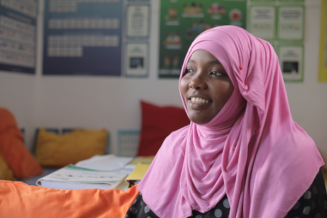
“When I dropped out of school, I could not even read full sentences. With the support from the Joint Programme, I gained the confidence to read, write and do basic mathematics. I now help other girls to learn how to read and write”, says Fatma, a businesswoman aged 25 from Mkoani.
Fatma dropped out of school like many girls and young women in Tanzania. Soon after, she was married and had three children. She felt like her dreams had ended when her education stopped at the age of 14. Life prospects are limited for girls and young mothers in Tanzania without an education, or the knowledge and skills for employment.
Fatma joined a community-based youth centre established by the Joint Programme, where she was taught basic literacy and numeracy. She also learned digital skills at the centre using a tablet and a smartphone provided by the Joint Programme to access other learning materials and build her entrepreneurship and vocational skills. She developed business management, accounting and communication skills.
Fatma is now pursuing her dreams. She opened a small grocery shop with the income she received for her work as a henna artist. She learned henna painting at the vocational training held under the Joint Programme. “I sell rice, sugar and some vegetables. It is such a big achievement being economically independent with my own income. My husband is supportive of my work.”
Fatma also provides guidance to young women in her community, sharing her own experience. “I helped my peers learn how to run a business. One of my friends also started her own business as a henna artist and a tailor.”
Ashura, an entrepreneur and role model from Kasulu

"People in the village no longer see me and other girls who dropped out as failures but see us as people leading our lives autonomously", says Ashura, an entrepreneur from Kasulu.
Ashura, a young mother now aged 22, could not continue learning after primary school due to her family's financial challenges. Girls and young mothers who drop out of school in Tanzania often take up household chores and are left behind from education. Without alternative learning opportunities and access to financial services, they are prevented from earning incomes and living autonomous lives.
When Ashura received entrepreneurship training and opportunities from the Joint Programme, she discovered how to run a small business making and selling products such as soap, batik and nutrition flour. She also learned how to apply for loans allocated to women’s groups by the District Council.
Starting out with seed money, Ashura increased her cash flow by selling sugarcane and rice. Together with a group of young women who had also benefited from the Joint Programme, Ashura formed an income-generating group to encourage women-led economic activities. Their financing model extended to the formation of a village community banking (or VICOBA).
VICOBA is particularly helpful when the existing social services are insufficient. "Each member of the group contributes 5,000-10,000 TZS (US$ 2-4) every two weeks. VICOBA money is like an insurance or a loan given to group members for any emergency needs", says Ashura.
As her life changed, Ashura noticed a change in the perception of community members vis-a-vis out-of-school girls, who were previously seen as failures and are now looked up to as role models in their community.
Rahma, a confident learner from Kasulu

“Through the Safe Space-TUSEME club, I gained the confidence to speak out to my friends, teachers and parents”, says Rahma, a grade 10 student. “I was motivated to study hard. That was why I passed the national exam with a good score.”
In Tanzania, only 69% of girls transition from primary to lower secondary education compared to 73% of boys, according to the UNESCO Institute for Statistics (2017). This is attributed to less support from the family, lack of confidence, gender-based violence (GBV) and adolescent pregnancy.
Rahma, aged 15, joined the Safe Space-TUSEME (‘Let’s speak out’ in Swahili) club established by the Joint Programme in her school. There, she learned about gender equality and GBV, where to report cases of GBV or seek guidance and counselling, and how to undertake collective action if faced with a GBV incident. Youth-led activities such as drama and poetry and advocacy with parents and teachers about the challenges faced by girls at school helped transform attitudes around girls’ education.
Encouraged through the club activities, Rahma successfully transitioned to secondary school with excellent exam results. Her relationship with her parents also changed positively: “Housework was considered only for girls. However, my parents don’t think like that anymore. They are encouraging me to study. They were delighted when I passed the national exam”, says Rahma.
Now, Rahma continues to take part in the Safe Space-TUSEME activities in her secondary school. Her club conducts campaigns to keep girls safe from adolescent pregnancy. “A night market is a common place where girls can be more vulnerable to adolescent pregnancy. With ongoing campaigns, now I see fewer friends are joining night markets”, says Rahma. She hopes other schools establish Safe Space-TUSEME clubs to support more girls to pursue their education. “I want to help other girls gain confidence.”
Warda, an ICT facilitator from Mkoani
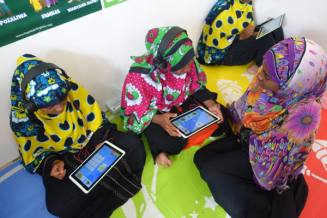
"We can teach girls how to read and write and acquire vocational skills so that they can be financially independent. I hope that more girls gain confidence, leadership, independence, higher income and are safe from violence. I believe empowering women is empowering society", says Warda, a young woman from Mkoani.
Warda was unemployed after graduating from college. She joined an ICT lab established by the Joint Programme as a facilitator. Through this role, she acquired teaching skills for literacy, numeracy and entrepreneurship using tablets. More than 200 out-of-school girls and young mothers in Mkoani learned business management, accounting and communications skills as part of the ICT lab.
One of Warda’s students, Zuhura, did not know how to read and write but learned through a self-learning application on a tablet. Now she runs a small business selling pillows and teaching other girls how to read and write and gain other basic entrepreneurial skills. Warda also created an income-generating group together with her students called the 'Women Association for Community Development Strategies', enabling the group to raise funds and sustain business ventures.
Girls who learned about entrepreneurship through the course at the ICT lab felt empowered, but empowerment was not limited to learners. "I gained the confidence to teach adults from any background. I am delighted to see their transformation as well as mine", says Warda.
She is currently empowering more out-of-school girls while following a Master's course. Recently, she also started a part-time job in the Mkoani district office. She dreams of expanding this initiative to other districts in Pemba, Unguja Island and even the Tanzania mainland.
Angel, a science wiz from Sengerema

"I told myself, 'Angel, you will not fail'. I became number one in physics and moved to upper secondary school", says Angel, aged 17. “I believe girls can do as well as boys in sciences.”
In Tanzania, poor pedagogical practices have led to discrimination and girls' lower performance than boys, especially in mathematics and science subjects in national examinations during the past five years. It is one of the reasons hindering the transition of girls from secondary to upper secondary education.
Teachers at Angel's secondary school received a Joint Programme training on gender-responsive pedagogy to counter stereotypes and socio-cultural bias reinforcing the notion that science subjects are not only for boys and difficult for girls.
With support from her teacher, Angel's performance in science, technology, engineering and mathematics (STEM) subjects improved. She achieved excellent scores in her national exams in biology among other subjects. She became the best female student within her school and was selected to focus her studies on physics, chemistry and biology.
Angel inspires other girls in her secondary school to study hard including in STEM subjects and to pass the national examination. Four of Angel's peers also successfully transitioned to upper secondary school. Angel also brought a positive influence home. Her parents are proud of her achievements at school and support her education.
Safia, a woman leader from Pemba
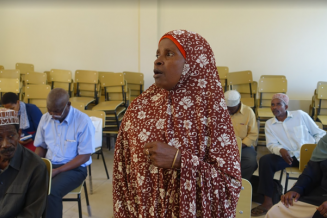
"Through the Joint Programme, more community members encourage the education of girls and boys, while discouraging early marriage and unintended pregnancy. It was helpful to persuade the government offices to establish a secondary school in our community", says Safia.
Safia is a community leader in Pemba island. She is one of five women leaders in 143 shehias (or wards) in the region, "Being a woman leader can be challenging, but my community members are very supportive", says Safia.
Safia became a champion for girls’ right to education through the Joint Programme. She and other community members developed dramas to engage her community to invest in girls’ education. They raised awareness among other community members about preventing early marriage and providing needed support for girls to continue their education. Since then, the number of girls transitioning to secondary education in her shehia increased from 5 to 15 girls.
Safia also advocated for the construction of the first secondary school for girls and boys in her shehia. Students used to go to neighbouring shehias to attend a secondary school. "It is very tough for students to transition to secondary education when there isn’t a secondary school in our community. Imagine girls taking boats to reach a secondary school in different shehias. It takes around 2 hours", says Safia.
"I expect more girls to continue schooling at the secondary school in our shehia. I hope that they will become women leaders like me when they grow up", says Safia.
Almachius, a community leader from Kasulu

"Through the Joint Programme activities, adolescent girls and young women became more empowered. Parents and community members, ward and district officers witnessed their growth. In return, they started to expand their support", says Almachius, a focal point for the Joint Programme in the Kasulu District Council.
Almachius has observed many positive achievements in the district. One of them is a loan from the District Council of 9,000,000 TZS (US$ 3,900), awarded to three women-led income-generating groups created by the Joint Programme. And in Heru Ushingo, the girls' transition rate from primary to secondary education has increased from 85% in 2017 to 99% in 2020 since the Joint Programme was initiated.
Also, 7 out of 15 schools in Kasulu have built more classrooms, toilets, water facilities and changing rooms for menstruation after trainings held by the Joint Programme on water, sanitation and hygiene. "It was possible because parents and community members who participated in the trainings donated bricks and volunteered to build school facilities. The Titye secondary school is even building a science, technology, engineering and mathematics laboratory", says Almachius.
As a result of this work, early marriage and unintended pregnancy rates have decreased. "Harmful social practices and gender-based violence decreased while reporting cases increased", says Almachius. The ward and district offices and schools worked closely with the Joint Programme to reinforce reporting mechanisms.
Almachius hopes to scale up this work to other wards in Kasulu. Six additional wards in Kasulu are already replicating the Joint Programme interventions to promote girls’ empowerment through education.





